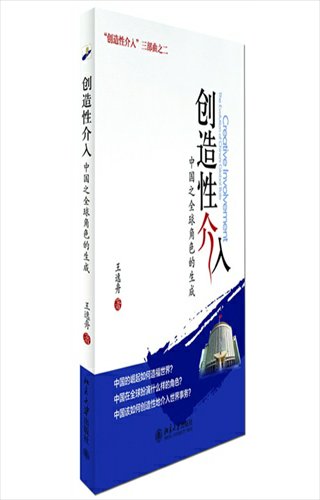HOME >> OP-ED
Creative involvement in global order can leave clearer Chinese imprint
Source:Global Times Published: 2013-8-15 17:58:01

Wang Yizhou, Creative Involvement: The Evolution of China's Global Role, Peking University Press, August 2013
With the rapid development and increase of its comprehensive national strength, China has already transformed from a regional power to a global one. China will inevitably be involved in more and more international affairs, and its former attitude of non-intervention may have to change with the times.Wang Yizhou, deputy director of Institute of World Economics and Politics under the Chinese Academy of Social Sciences and vice dean of the School of International Studies of Peking University, has raised a concept named "creative involvement" in his works.
Creative Involvement: The Evolution of China's Global Role, published by Peking University Press in August, is the second part of a planned trilogy, in which Wang further analyzes the concept of creative involvement and the role China should play in this new era.
According to Wang's interpretation, creative involvement is a concept calling on China to play a more active role and voluntarily get involved in international affairs. Meanwhile, China's creative involvement has its own characteristics and is not like US interference. It takes other countries' acceptance and China's own strength into consideration. Such involvement cannot be equaled to interference, Wang insists.
China was a red giant in the era of former leader Mao Zedong. During that time, in order to maintain political independence, China's diplomacy focused more on the spirit of ideological struggle when communicating with the outside world. Even after the reform and opening-up in 1978, guaranteeing domestic development still remained the dominant theme of China's policy.
However, the international dynamics have changed, and China has entered a new era in which the international community has new demands of this global power. In such circumstances, Wang believes China's diplomacy should be in line with the change of its global role and transform from a free rider to a creator in the changing international system.
To achieve this goal, Wang holds that China should move past its previous non-interference doctrine and methods of providing foreign assistance, and attach more importance to global and regional public goods.
Wang gives Africa as an example, saying that providing public goods to the continent not only represents the deep-rooted friendship between China and Africa, but also reflects the strategic strong points of China's cooperation mechanisms, as well as China's fulfilling of its international obligations in a new era.
Moreover, according to Wang, China should learn from Europe on how to play a global role. Europe is a setter of international norms as well as an exemplar of regional integration. By looking at others' faults, wise people correct their own. Europe's experiences in playing a global role offer enlightenment to China.
The concept of creative involvement represents an active attitude. Given that China already has a global role, it has to actively participate in international and regional affairs, so as to imprint the future international pattern with China's own contributions.
Posted in: Fresh off the Shelf, Viewpoint